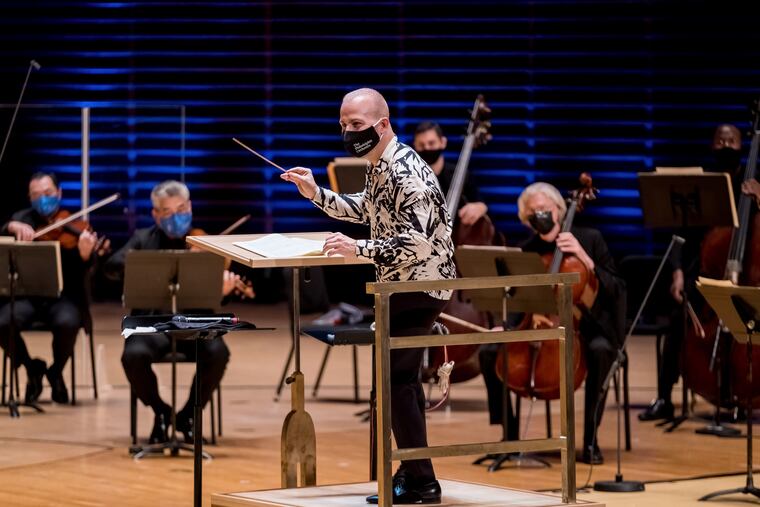Philadelphia Orchestra performs a Mahler ‘Symphony No. 4’ you’ve probably never heard before
Yannick Nézet-Séguin found all kinds of hidden advantages in a slimmed-down chamber orchestra version. Also on this week's Digital Stage program: a dazzling new work by Jessie Montgomery.

The world refuses to do without Gustav Mahler, whose symphonies require a density of musicians that’s not at all appropriate in our era of social distancing.
For its latest Digital Stage concert, the Philadelphia Orchestra thus joined the bevy of ensembles doing a reduced-orchestration version of Mahler’s Symphony No. 4, premiering online 8 p.m. Thursday. Music director Yannick Nézet-Séguin finds all kinds of hidden advantages in what could’ve been a second-best experience — in a program filled out by Starburst, an engaging new work by Jessie Montgomery.
» READ MORE: The Philadelphia Orchestra, now online, has become a critical source of serenity
It’s hard to believe Mahler’s charming symphony (ending with a child’s vision of heaven) actually needed a chamber orchestra version in order to be heard during an extended eclipse of the composer’s visibility following his 1911 death. This version was created in 1921 by Erwin Stein for Arnold Schoenberg’s Society for Private Musical Performances in Vienna, and the difference is soon apparent when the opening movement’s iconic sleigh bells are accompanied mainly by piano.
If your ears immediately adjust to the reduction of players from 80 to 20, don’t take it for granted. One of the first post-lockdown concerts anywhere was a Berlin Philharmonic streaming of this version in early May. It made a threadbare impression — though in all fairness, the Berliners looked a bit dazed.
The Philadelphia difference perhaps lies in a smart arrangement of the musicians: The piano, which clarifies so many elements of the score, is up front directly facing Nézet-Séguin. Further back is organist Paul Jacobs, who has the Kimmel Center’s Fred J. Cooper Memorial Organ masquerading as a humble harmonium, though with carefully chosen colors that give a firm foundation to the overall sonority.
The many incidental solos in the symphony are more visible than ever, and the players treat them almost like characters in an opera. The spooky, folksy violin solos of the second movement are divided between hearty, rustic David Kim and Kimberly Fisher being the more emotional truth-teller.
The main advantage of the smaller forces is the constant tempo flexibility — very much in the spirit of the score’s performance markings, long ignored by major conductors who feared a cogent performance wouldn’t be possible otherwise.
Nearly every passing idea has its own tempo here. Nézet-Séguin has long given special attention to fluid transitions, and that particular talent allows this constant seesawing to open up many expressive doors often left closed.
While the performance often lingers (without dallying), the grand third-movement moment when the gates of heaven seem to open is handled briskly. Nézet-Séguin doesn’t give you time to consider how it compares to the original.
With her lush but articulate soprano voice, Janai Brugger is a near-ideal soloist for the final movement (actually a song about busy saints in heaven). The last stanza had a hushed reverence that featured some of the most deeply felt playing I’ve heard from the orchestra of late.
Montgomery’s Starburst may be a misnomer: I heard nothing resembling the title, but something better.
This short piece by this emerging violinist/composer (recently commissioned by the New York Philharmonic) was a like a highly compressed catalog of every possible antiphonal effect within a string orchestra.
Rhythmically infectious, ceaselessly inventive, the piece is challenging for the players and dazzling to the ear. Like many new works written these days, a preexisting definition — overture or fanfare or prelude — isn’t needed. Starburst can just be a celebration of orchestral ingenuity.
The Philadelphia Orchestra concert is streamed from 8 p.m. Dec. 3 through 11 p.m. Dec. 6. Tickets: $15. Information: philorch.org.